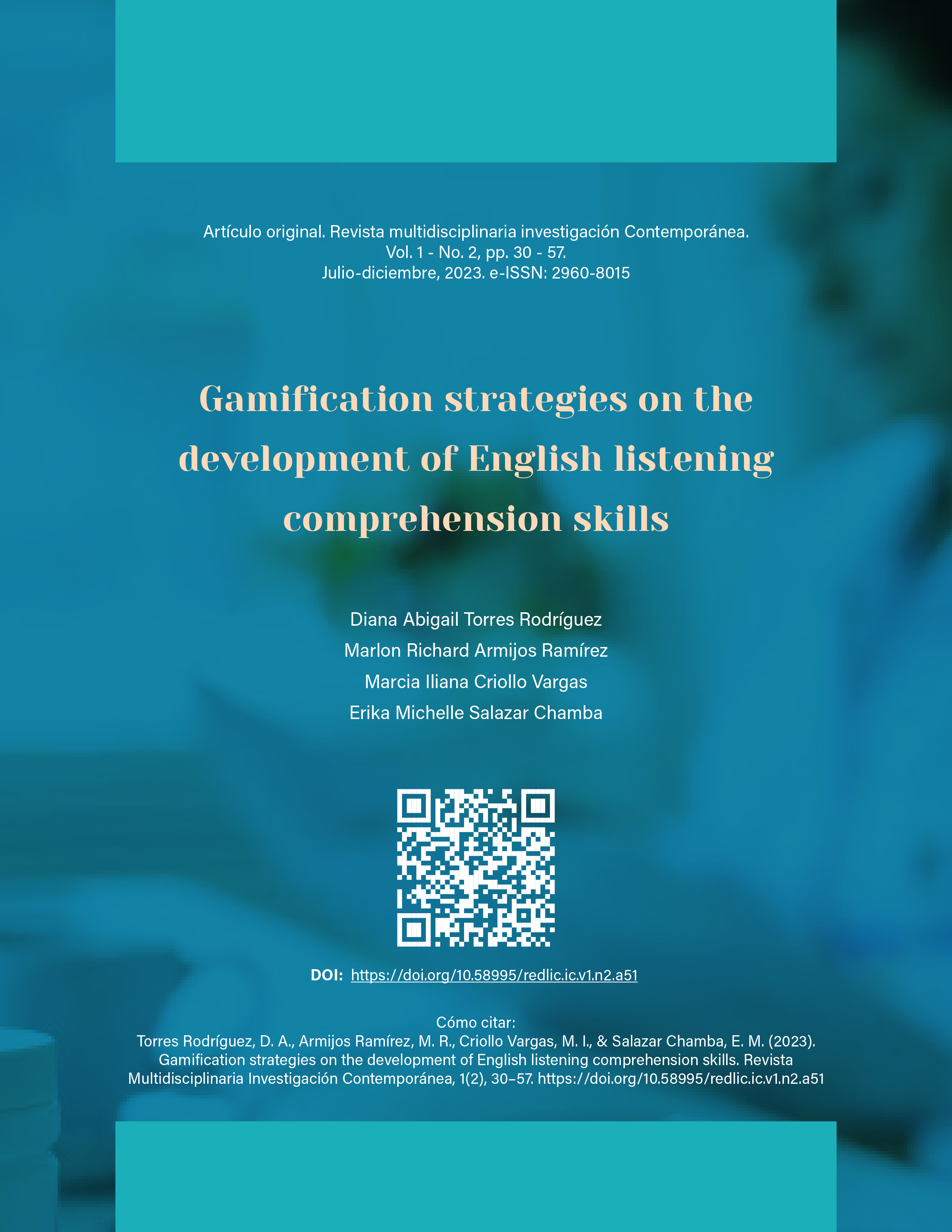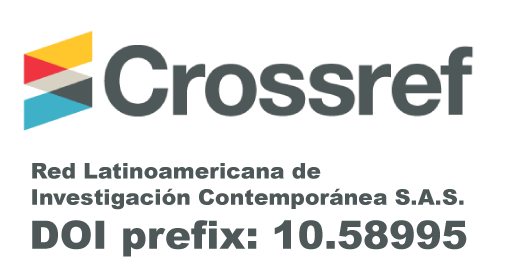Gamification strategies on the development of English listening comprehension skills
Resumen
English classes have faced some difficulties in attracting students' interest in the English listening comprehension class using the traditional method of learning. Most of the students are losing their interest in the English Language class due to lack of engagement between students and teachers. This is an action research study focused to improve English listening comprehension skill by using gamification among superior basic education students at a public institution Loja city. A convenience sample of 35 students participated in the study for eight weeks with 40 hours of instruction. To achieve the objective of the study, the researcher applied a pre-test, post-test, and a questionnaire were used to gather quantitative and qualitative data. The test included five questions about listening sub-skills: listening for general understanding, sequence and for specific information. A mixed-question type of questionnaire was administered to determine students’ perceptions about gamification strategies such as badges, rewards, leaderboards, competition, motivation, dynamic and listening games. The pre-test and post-test difference indicated that the students increased meaningfully in listening comprehension skill. Furthermore, the questionnaire discovered that gamification strategies had good students’ perceptions, because they increased their motivation, competency, social interaction and the dynamic environment in the class
Descargas
Referencias
- Abla, B. C., & Fraumeni, B. R. (n.d.). Student Engagement.
- Al-dosakee, K. (2021). Gamification in Teaching and Learning Languages : A Systematic. Revista Românească Pentru Educaţie Multidimensională, 13(2), 559–577. https://doi.org/doi.org/10.18662/rrem/13.2/436 Gamification DOI: https://doi.org/10.18662/rrem/13.2/436
- Al-Jawi, F. D. (2010). Teaching the Receptive skills. https://teachertrainingcourse2014.weebly.com/uploads/4/0/8/7/40879903/receptive_skills.pdf
- Barros, W., Jos, I., & Federal, U. (2021). Gamification practices in tourism : An analysis based on the model by Werbach & Hunter ( 2012 ) Praticás de gamificação em turismo : Uma análise a partir do modelo de. 15(2012), 1–15. DOI: https://doi.org/10.7784/rbtur.v15i3.2067
- Bevins, K. L., & Howard, C. D. (2018). Game mechanics and why they are employed: What we know about gamification so far. Issues and Trends in Learning Technologies, 6(1). DOI: https://doi.org/10.2458/azu_itet_v6i1_bevins
- Boudadi, N. A., & Gutiérrez-colón, M. (2020). Effect of Gamification on students ’ motivation and learning achievement in Second Language Acquisition within higher education : a literature review 2011-2019. 28(1), 57–69. https://doi.org/https://doi.org/10.4995/eurocall.2020.12974 DOI: https://doi.org/10.4995/eurocall.2020.12974
- Buljan, M. (2021). Gamification For Learning: Strategies And Examples. https://elearningindustry.com/gamification-for-learning-strategies-and-examples
- Campos, M. (2023). Listening for Gist and Detail. English Post.Org. https://englishpost.org/teaching-activity-listening-for-gist-and-detail/#:~:text=listening is about.-,What’s Listening for Detail%3F,necessary to complete the task.
- Gay, L. ., Mills, G. E., & Airasian, P. W. (2012). Educational Research Competencies for Analysis and Applications. Pearson. https://www.ptonline.com/articles/how-to-get-better-mfi-results
- John W. Creswell. (2012). Educational Research. https://www.ptonline.com/articles/how-to-get-better-mfi-results
- Juntunen, R. (2019). Gamification of language learning.
- Kapp, K. M. (2012). The Gamification of Learning and Instruction: Game-based Methods and Strategies for Training and Education. John Wiley & Sons. https://bit.ly/3JOvcyb DOI: https://doi.org/10.1145/2207270.2211316
- Mazabel, J. E. M. (2021). Gamified Activities as a Pedagogical Tool to improve English Listening Skill in third Grade Students of the Obando E.I Municipality of San Agustin. 1–127. https://bit.ly/3JGYoXS
- Mee, R. W. M., Shahdan, T. S. T., Ismail, M. R., Ghani, K. A., Pek, L. S., Von, W. Y., Woo, A., & Rao, Y. S. (2020). Role of gamification in classroom teaching: Pre-service teachers’ view. International Journal of Evaluation and Research in Education (IJERE), 9(3), 185. https://doi.org/10.11591/ijere.v9i3.20622 DOI: https://doi.org/10.11591/ijere.v9i3.20622
- Mobbs, A., & Cuyul, M. (2018). Listen to the Music : English Teaching Forum. https://files.eric.ed.gov/fulltext/EJ1181086.pdf
- Pesce, C. (2013). Listening with a Purpose. Busy Teacher. https://busyteacher.org/17878-esl-listening-activities-7-types.html
- R., A. D. (2013). Improving listening skills through interactive games in the seventh grade at smp n 2 kalasan in the academic in tiie sevei { tii grade at smp n 2 kalasai { in tiie academic year or 2012 / 2013.
- Rodliyah, R. S. (2016). Using a Facebook Closed Group To Improve Efl Students’ Writing. TEFLIN Journal - A Publication on the Teaching and Learning of English, 27(1), 82. https://doi.org/10.15639/teflinjournal.v27i1/82-100 DOI: https://doi.org/10.15639/teflinjournal.v27i1/82-100
- Shpakova, A., Dörfler, V., & MacBryde, J. (2016). The Role(s) of Gamification in Knowledge Management. EURAM 2016: 16th Annual Conference of the European Academy of Management, At Paris, July 2021, 1–39.
- Syafii, M. L., Kusnawan, W., & Syukroni, A. (2020). Enhancing Listening Skills Using Games. International Journal on Studies in Education, 2(2), 78–107. https://doi.org/10.46328/ijonse.21 DOI: https://doi.org/10.46328/ijonse.21
- Zahra, S. B. (2020). The benefits of gamification in learning. International Journal of Advance Research and Innovative Ideas in Education, 6(2), 1671–1675. http://ijariie.com/AdminUploadPdf/The_Benefits_of_Gamification_in_Learning_ijariie11788.pdf
- Zichermann, G., & Cunningham, C. (2011). Zichermann, G.; Cunningham, C. Gamification by design: Implementing game mechanics in web and mobile apps. O’Reilly Media, 2011. In O’Reilly Media, Inc. http://storage.libre.life/Gamification_by_Design.pdf
- Zirawaga, V. S., Olusanya, A. I., & Maduku, T. (2017). Gaming in Education : Using Games as a Support Tool to Teach History. Journal of Education and Practice, 8(15), 55–64. https://files.eric.ed.gov/fulltext/EJ1143830.pdf

Publicado 2023-07-01
Palabras clave
- Strategies,
- English learning,
- gamification listening comprehension skills,
- students’ perceptions
Número
Sección
Derechos de autor 2023 Diana Abigail Torres Rodríguez, Marlon Richard Armijos Ramírez, Marcia Iliana Criollo Vargas, Erika Michelle Salazar Chamba

Esta obra está bajo una licencia internacional Creative Commons Atribución-NoComercial-SinDerivadas 4.0.



















